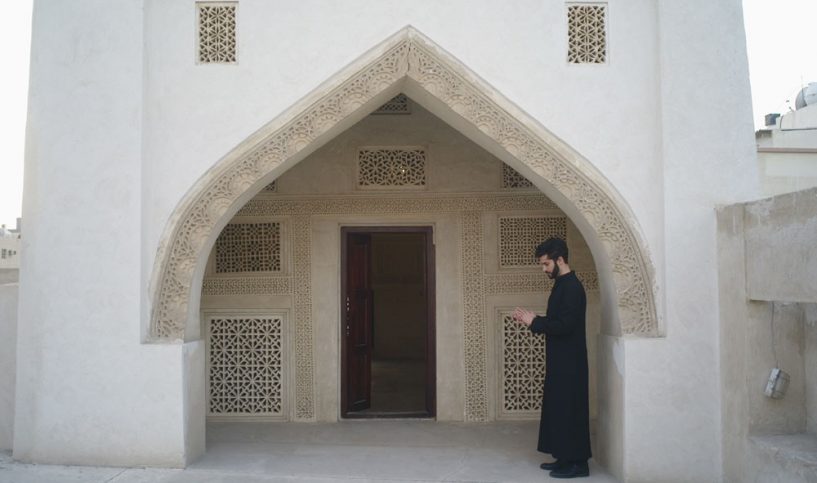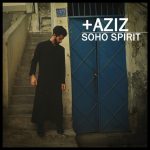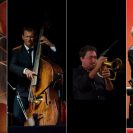Now I may not be the most active person on Twitter, some may even say I’m more of tweectator (Twitter spectator) than a tweeter. Imagine my surprise when I got a pitch for a story through Twitter. Obviously my lead’s reputation precedes him, because when I shared the news with the office everyone got giddy. Naturally, I pursued it and was stupefied by how eloquent he was. A few direct messages later, I got an email loaded with information. The pitch: a unique album that’ll be released later in the month, a beautiful single that resonates with the soul, and an in-depth feature about the man behind it all. We get up close and personal with the eloquent +Aziz, despite his very busy schedule!
Indie Folk is the best way I can describe the sounds I’m listening to while typing away. As a writer that’s fluent in Arabizee (an amalgamation of Arabic and English) +Aziz’s debut album SoHo Spirit depicts the flawless utilization of this “language”, and it makes perfect sense to me. “It’s important to note that bilingualism in rock music is not uncommon,” he explains, “Jónsi from Sigur Ros went as far as creating his own language to sing in. What matters most is the feeling you communicate.” As an amateur music aficionado, I completely agree. Music is a personal experience that resounds with the listener on a deeper level, and has a much more intimate connection. As an Arab, it is important to him to express his heritage through the music. Combining the rhythms of the East with a distinct sound of the West and both languages melodically synced, you find yourself transported to a deeper plane of musicality that transcends lyrical content.
In places like Cairo, Beirut, and Amman, the indie music scene is thriving both on local and international levels – the Gulf, Khaleeji, region on the other hand, not so much. Sensing this gap, +Aziz decided to put the Gulf on the indie musical map. While mainstream Gulf music has been utilizing other Arabic dialects, +Aziz wants to revitalize his native dialect particularly through the indie and world music scenes. “Khaleeji music has virtually no presence,” he explains, “it’s overshadowed by related cultures like Turkish, Indian, Iranian, Lebanese, Egyptian, and so on.” Although he tends to draw on different dialects while performing, the Gulf dialect takes center stage when he sings in Arabic. Quality also plays a huge factor in Arabic music these days. According to +Aziz, digital and analog instrumentation need to mesh seamlessly for better quality music. Motivated by the aforementioned lack of Arabic music, his biggest passion is to create beautiful music that unites the East and the West.
With Ramadan upon us, we all get into the spirit of fasting and breaking our fast together. For +Aziz, it’s bigger and more challenging than that. His single, “RMDN,” makes that apparent. “Ramadan has a very special energy for all of us,” he smiles. The Holy Month is a time for families to be together. Growing up, +Aziz had his days surrounded by family and filled with family meals. Upon relocating, it has been a trying time since he’s been left to fast, and feast, alone for many years. “’RMDN’ is a song that works to surface my feelings about this sharp contrast,” he begins, “feelings which are reinforced by the hierarchy of social media and my inability to belong despite being swallowed by social media platforms.” SoHo Spirit being his first public EP is a big deal for him, but it’s his single that’s most special and his favorite song written so far.
Inspired by the meeting of the raw and refined in the New York neighborhood of SoHo, the album name SoHo Spirit was conceptualized to sync perfectly with his musical notion. He also performed and recorded the EP in an office building he worked at on Hudson Street in SoHo. Still, +Aziz managed to perform and record his shorter sessions at the Karrouhat Studios in Salwa, Kuwait. He split his recording sessions between New York and Kuwait encapsulating both cultures and sounds through his music. While his “musical ethos” lies in alternative rock, he’s become very inspired by Second Line music (New Orleans’ renowned parade music). The Gulf rhythm, however, resonated with him through friends like Kuwaiti composer Mishari Hamad and the Bahraini sound artist Hasan Hujairi. On collaborating mainly with producer Seif Al-Din, +Aziz explains, “[he] helped me develop beats and the sonic texture of the EP.” He also worked with Karrouhat Studios’ Basil Al-Hadi and folk musician Matthew Halley who lent the banjo sound and backing vocals to his tracks.
“Crafting a message” is not part of his lyrical process. +Aziz’s method focuses on communicating a feeling as opposed to a meaning or narrative. “Lyrically, [I] have two processes – first, the song is birthed within minutes after picking up a pen or guitar,” +Aziz elaborated, “and second, the song is layered and fragmented.” While layering and fragmenting are more common processes for +Aziz, his music sheds light on several musical cultures and their flawless meshing.
A sound to follow – +Aziz’s musical journey might just be starting, but he’s already got another project in the works. Inspired by the sounds of the American south, his next project will dig deeper into the fabric of New Orleans to uncover the city’s sound. Combing it with the sounds of the Gulf, +Aziz’s next project – like this one – will celebrate both Khaleeji and New Orleanian musical heritages as a unique collaboration. Lastly, when asked about his album’s cover image taken by photographer Ghada Khunji while in Manama, he said, “[It] conveys the driving concept of SoHo Spirit: the contrast of the raw/rustic/gritty against the refined/smooth/sophisticated.” The image is just as captivating as the sounds of SoHo Spirit and all encompassing of the true spirit of Ramadan.
Questionnaire:
What do you most value in your friends?
Reliability and responsiveness.
What is your idea of perfect happiness?
A world that is run by women.
What is your greatest fear?
Divorce.
What is the trait you most deplore in yourself?
The way I expect so much from others.
What is the trait you most deplore in others?
Fear of reputation damage; we’re only human.
Which living person do you most admire?
Sabah Al-Rayes. A highly cultured Kuwaiti architectural engineer at PACE who encouraged me to develop and sharpen my musical IQ.
What is your greatest extravagance?
Asking everyone to put a plus sign in front of my name.
Which words or phrases do you most overuse?
Cultural insights, corporeal, ethnomusicology.
What is it that you most dislike?
Cover songs.
Which talent would you most like to have?
Lucid dreaming.
If you could have any job, what would it be?
A freelance ethnographer.
What would you consider your greatest achievement?
Raising $11,000 for my crowdfunded project, UNCOLLECTABLE in 2013.
What is your most treasured possession?
My bicycle.
What is your most marked characteristic?
The black polish on my fingernails.
Where would you most like to live?
A city without cars.
What are your favorite words to live by?
Artists don’t sell out, companies buy in.
If you want to follow +Aziz’s musical journey and generally find out more about him, his music, and his many, many trades – check out his social media accounts on Facebook: KhaleejiInNewOrleans and @PlusAziz on Soundcloud, Twitter, Vimeo, Tumblr, ENGAGE. You can buy the full album from CD Baby, iTunes, or Amazon – Check out the single on Soundcloud @PlusAziz or have a listen below!
You can also tune in live on the livestreaming app Periscope @PlusAziz on Wednesday nights for band rehearsals at 3 a.m. and Sunday nights for his practice sessions from home at 7 p.m. Kuwait local time. Photography by Ghada Khunji and André Steënkamp.
[soundcloud url=”https://api.soundcloud.com/tracks/207311816″ params=”auto_play=false&hide_related=false&show_comments=true&show_user=true&show_reposts=false&visual=true” width=”100%” height=”450″ iframe=”true” /]













